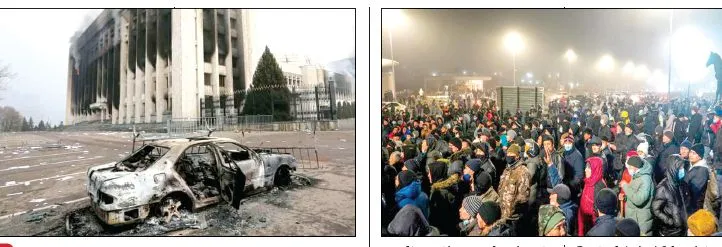Ostensibly, the Arab Spring in the last decade after accomplishment of its goals for the world players behind the game is now all set to gain ground so as to be repeated in Central Asia. This is what is growingly perceived in Moscow, Central Asian capitals, Kabul and perhaps in Islamabad too.
As protests in the oil-rich Central Asian country gain momentum, the events threaten to reverberate across the region. Protests in Kazakhstan incited by anger over surging fuel prices have intensified into something more combustible, and sanguineous clashes over the future direction of the country that have prompted a Russia-led military intervention and the killing of scores of demonstrators.
Several thousand of angry protesters took to the streets of Kazakhstan, inviting the biggest crisis to shake the pseudo-democratic, in form, but autocratic in reality, Central Asian country, since it gained independence in 1991. Many buildings and police vehicles in Almaty have been set ablaze.
It is largely believed in the region that the revolt against Nur Otan Party, apart from mis-governance, has roots somewhere else. The President Kassym-Jomart Tokayev has authorised the nation’s security forces to “fire without warning.”
The harsh response is a reflection of the stark challenges he faces less than three years into his rule, and seems to portend a protracted crackdown on all forms of dissent. The protests are destabilising an already volatile region where Russia and the United States insolently compete for influence.
The public uprising also symbolises a widespread restless longing against Kazakhstan’s suffocating authoritarian Government marred with endemic corruption and lack of a real democratic freedom.
The Price hike in L.P.G. — a low-carbon fuel that Kazakhs use to power their cars started the main trouble. Although the revolt is said to have more deep-seated roots, in social and economic disparities, aggravated by a raging pandemic, the international politics is seemingly taking full advantage of the situation to fit their sinister designs in to it.
Despite all odds, a Kazakh has an average salary equivalent of $570 a month which might be lower in certain cases. Reasonably the public unrest has put all of the Central Asia, Russia and Taliban in Kabul on tenterhooks.
The previous year’s public revolt as witnessed in Sudan that ended in overthrowing of President Bashir’s government was also said to be a consequence of widespread corruption and lack of true democratic freedom that in turn eventually led to the formation of another autocratic government laying down formal diplomatic relations with Tel Aviv for the first time.
The public unrest remains unabatedly, surfacing intermittently in Sudan since then. The US defeat in Afghanistan and her loosening diplomatic grip over Islamabad, Kabul and the Caucasus regions like Ukraine, where she has been baffled by Vladimir Putin’s aggressive postures through his mammoth military might has set in an element of desperation.
The US is desperately in search of an alternative mechanism to ensure Washington’s hark back in the region in order to breakdown the growing ties between South Asian region occupying Beijing Islamabad and Kabul with Central Asia and the Caucasus giant, the Russian federation.
Without any doubt the progressive and growing inclination of Russia-Central Asia-Afghanistan-Pakistan and China’s policy synchronization in order to march towards formation of a World block parallel to US-NATO and QUAD alliance is giving sleepless nights to US, habitually given to the rule of the world as the sole world power.
The world dominance of US dollar to reign in the global economy has been battered away in Erdogan’s Turkey and is highly feared in highest economic circles in Washington to be replicated by the newly emerging block. Should it happen, America’s colossal economic structure would be in shambles, a calculated fact that is worrisome to the political top brass in Washington.
The Russian President Vladimir Putin’s most recent statement glorifying the Prophet of Islam and his inculpatory decree to time and again held blasphemy in the West comes in-line with the present political urge since Central Asia Afghanistan and Pakistan have overwhelming Muslim majority. This has had an incredible impression left on the Muslim masses of the World.
Apparently CIA as is envisaged by the regional argus-eyed political analysts has emptied its arsenal to change governments and their dynamics in the states stretched over the Asia-Central Asia to Caucasus region but without an avail. Pertinently Imran Khan’s “Absolutely Not” to US inevitably had roots in Beijing and of course Moscow’s strong backing.
The launch of ISIS-Khorasan rebellion against Taliban regime in Afghanistan did not seem to be long lasting. It did not prove to be a hard nut to crack particularly when Kabul enjoyed fullest backing from Beijing and Moscow.
Earlier US had been using the instrument of “true democracy” around the World to gain her influence as witnessed in Afghanistan, Libya and Syria but surprisingly Washington never ever seemed to be serious about it in Arabian Peninsula and derailed democracy in Egypt and Tunisia.
Disclaimer: The views and opinions expressed in this article are the personal opinions of the author.
The facts, analysis, assumptions and perspective appearing in the article do not reflect the views of GK






